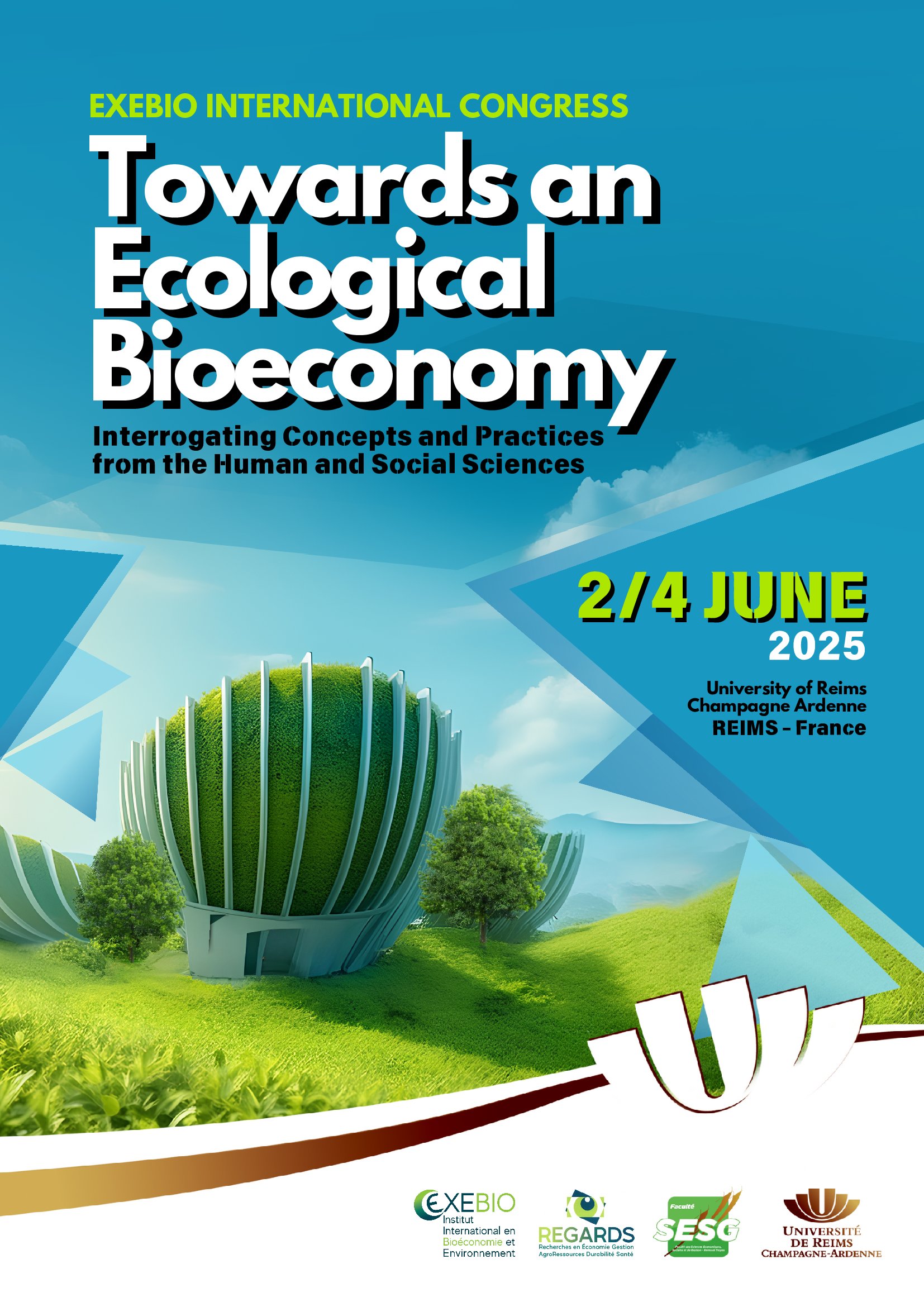
Towards an Ecological Bioeconomy
Interrogating Concepts and Practices from the Human and Social Sciences
2-4 June 2025, Reims, France
Presentation
The bioeconomy holds the promise of leading society into a post-oil era and driving the ecological transition. However, the term itself remains contentious, as it covers a wide range of interpretations and approaches, each with significant implications for the economic, social, and environmental development models that may be pursued.
International institutions such as the OECD and the European Union advocate distinct visions of the bioeconomy, promoting new pathways for the valorization of organic resources—including both living organisms and food and non-food materials—as part of the broader pursuit of green growth and the transition toward a new societal model (OECD, 2009, 2017; EC, 2012, 2018). Yet, this shared objective seems somewhat elusive, as each institution advances its own understanding of the bioeconomy. For instance, the OECD tends to emphasize a biotechnology-driven bioeconomy, while the European Union favors a model rooted in biorefineries and regional development. These differing perspectives are further reinforced by the resources allocated to the scientific and technological sectors to fulfill these competing promises.
Although these positions may appear stable and widely accepted, the academic field of social sciences—particularly economics—continues to identify a multiplicity of bioeconomy models, casting doubt on the possibility of arriving at a single, unified definition or framework (e.g. debates around green growth, degrowth, post-growth). The emergence of new research programs, such as those focused on the "circular bioeconomy" aimed at promoting green growth, and the revival of an ecological bioeconomy, initially conceptualized in the 1960s by heterodox development economists to challenge the myth of infinite growth and productivism (Georgescu-Roegen, 1971; Sachs, 1981; Passet, 1979), have only contributed to further diversification in the understanding of the bioeconomy.
These examples highlight the growing complexity and breadth of the bioeconomy, which spans a wide spectrum of models and applications. This presents a significant challenge for the social sciences, particularly economics, as they are uniquely positioned to analyze the transformations and reconfigurations that are shaping our society. Central to this challenge is the need to critically evaluate whether the promises of the bioeconomy truly align with the goals of the ecological transition. In this context, it is essential to rigorously examine the concepts and practices associated with the ecological bioeconomy, utilizing the analytical tools provided by interdisciplinary research in the social sciences.
This international conference, organized by the University of Reims Champagne-Ardenne within the framework of the Idex EXEBIO initiative, seeks to create a platform for critical reflection. It will bring together researchers and bioeconomy stakeholders to engage in discussions and debates on these key issues, contributing to the conceptualization and development of an ecological bioeconomy. The conference will feature thematic sessions based on submitted contributions, special sessions proposed by participants, as well as a Summer School. These forums will offer opportunities to review current research, identify new questions and challenges, and envision future research and educational programs. The conference aims to gather social science researchers (e.g., in economics, management, sociology, spatial planning, geography, political science, and law) alongside bioeconomy practitioners. It is also open to scholars from Science, Technology, and Society (STS) studies who conduct reflective and critical research on the themes of the conference.
Guest Speaker
- Pr. Mario Giampietro (ICREA Research Professor) – Autonomous University of Barcelona (ICTA) – confirmed. More information.
- Pr. Andreas Pyka - University of Hohenheim - Confirmed
We invite contributions on the following seven themes:
- 1. Conceptualizing the ecological bioeconomy: Ontological Approaches, Epistemological Approaches, and History of Thought
- 2. New tools for an ecological bioeconomy: Ecological Accounting, Indicators, Interdisciplinary Studies, AI, Big Data, Prospective Tools
- 3. Sectoral emergence and reconfiguration: Health, Agriculture, Industry, Automotive, Construction, etc.
- 4. Circular bioeconomy: Biomass and transformation value chains: Urban, Agricultural, Forestry, Marine
- 5. Bioeconomy, innovation, and territorial development: Territorial Reindustrialization, Carbon Storage (Soil Carbon Sequestration – SCS; Bioenergy with Carbon Capture and Storage – BECCS), Low-tech/High-tech, Bioeconomy and Research, Bioeconomy Financing
- 6. Bioeconomy and organizational change: Business Models, Biorefineries, Biogas production, Wood/Energy Sector, Agroecology, Agroforestry, Farming, Agricultural Cooperatives, Multinational Corporations
- 7. Bioeconomy and Society: Social Justice, Conflicts and Mobilizations, Technical Democracy and Controversies, Ethics, Consumer-Citizen, Innovative Bioeconomy Training
Three types of contributions are suggested:
- Research contributions: Contributions in English, presenting original research results, with a focus on conceptual and theoretical developments in the field of bioeconomy. They will be evaluated through a double-blind peer review process.
- "Bioeconomy in Action" contributions: These contributions will focus on the implementation and practices of the bioeconomy, providing examples of local initiatives, national projects, or innovative public policies.
- Poster presentations: Posters in English will be aimed at young researchers (PhD students, post-docs, early-career researchers) who wish to present ongoing research or preliminary results.
All contributions will be evaluated based on a summary of 1 to 2 pages (maximum 1000 words).
Special Session Proposals
Proposals for special sessions centered around the conference themes are welcomed. Each proposal should include a title, a brief description (300 words), and, if feasible, the names of the presenters (3 to 4), along with a summary of their contributions. These sessions are designed to encourage in-depth discussions on specific aspects of the bioeconomy. Special sessions may feature presentations of scientific research, research project showcases, and initiatives led by bioeconomy stakeholders.
